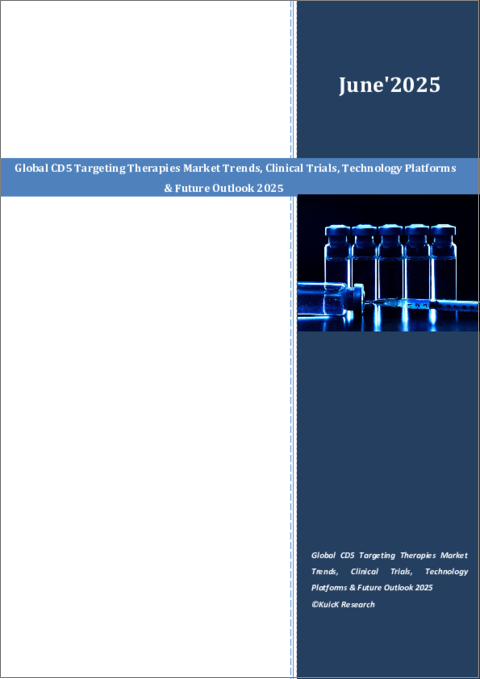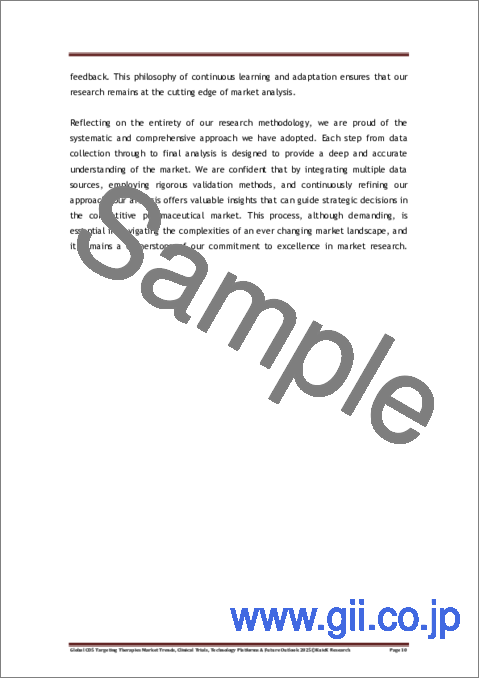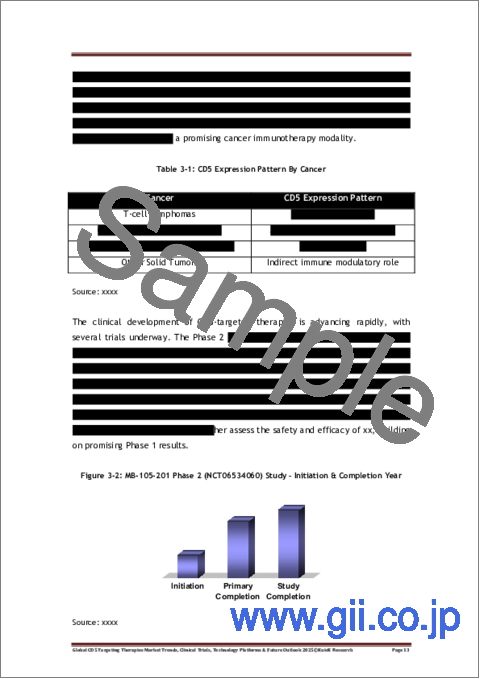|
|
市場調査レポート
商品コード
1752393
CD5標的治療薬の世界市場:市場動向、臨床試験、技術プラットフォーム、将来の見通し(2025年)Global CD5 Targeting Therapies Market Trends, Clinical Trials, Technology Platforms & Future Outlook 2025 |
||||||
|
|||||||
| CD5標的治療薬の世界市場:市場動向、臨床試験、技術プラットフォーム、将来の見通し(2025年) |
|
出版日: 2025年06月01日
発行: KuicK Research
ページ情報: 英文 72 Pages
納期: 即日から翌営業日
|
全表示
- 概要
- 図表
- 目次
CD5標的治療薬の世界市場:市場動向、臨床試験、技術プラットフォーム、将来の見通し(2025年)レポートのハイライトと所見
- 現在、CD5標的治療薬の商業的承認は得られていない
- CD5標的治療薬の開発フェーズは最高レベル:第II相
- 臨床試験中のCD5標的治療薬の数:10未満
- CD5標的治療薬の企業別、国別、適応症別、相別の臨床試験
- 動向世界のCD5標的治療薬市場開発動向
- CD5
- 標的
- 治療薬開発技術&プラットフォームに関する洞察
- レポートに含まれる
- CD5標的治療薬のモダリティと作用機
- 序に関する調査手法
CD5標的治療薬市場は急速に勢いを増しており、特に血液悪性腫瘍を対象とした免疫腫瘍学領域で有力となっています。PD-1やCTLA-4のような古典的な免疫チェックポイント・ターゲットが固形がん領域で十分に確立されている一方で、CD5は、T細胞上に存在し、その背景にある独特の生物学的特性により、より魅力的になっている、あまり伝統的でない免疫チェックポイント・ターゲットです。CD5は一部のT細胞リンパ腫や白血病で高発現しており、有用な治療ルートが限られているがんにおいて魅力的な治療ルートを提供しています。T細胞免疫生物学における専門知識の広がりは、再発または難治性の血液悪性腫瘍に対する治療法の欠如と相まって、CD5を脚光を浴びる存在にしています。
CD5治療における最近の動向で最もエキサイティングなのは、細胞療法、特にCAR-T療法とCAR-NK療法です。最も開発が進んでいるのが、マーチ・バイオサイエンシズ社の自己CD5標的CAR-T細胞療法MB-105です。ベイラー医科大学で開発されたMB-105は最初の成功を収め、第1相試験で5年間寛解した患者もいます。この治療法は、CD5の迅速な分解動態を利用することにより、T細胞の機能を維持し、フラトリサイドの問題を巧妙に回避しています。この技術革新により、MB-105はCD5陽性T細胞リンパ腫の治療薬としてFDAから希少疾病用医薬品の指定を受け、2025年初頭には第2相臨床試験に進むことができました。
March Biosciencesは、MB-105の治療価値に対する信頼の証として、投資家や機関投資家の大きな支持を集めています。同社は2024年後半にシリーズAラウンドで2,840万米ドルを調達し、テキサスがん予防研究機構や調査レディからの助成金など、複数の非希薄助成金を獲得しています。このような強力な資金調達は、March Biosciencesが大規模な製造を行い、臨床開発を効果的に進めることを保証するものです。
CD5を標的とする他の治療薬も新しいプログラムで進展しています。Vittoria Biotherapeuticsは、自社プラットフォームでVIPER-101(Senza5 CART5)を開発しており、T細胞リンパ腫を対象に第1相試験を実施中です。一方、GCセルは、NK細胞ベースの治療の典型的な欠点であるNK細胞の持続性を高めるためにインターロイキン15を組み込んだCAR-NK療法GCC2005の臨床試験を開始しました。これは、AACR2025で発表されたキュロセルの同種CD5 YδCAR-T候補に代表されるように、従来のT細胞標的からNK細胞、さらにはYδT細胞へとCD5標的戦略の多様化の一環です。
このような開発があっても、CD5標的療法には大きな課題があります。固形がんは依然として困難な疾患であり、腫瘍微小環境における耐性、標的外毒性、トラフィッキングの制限などのトランスレーショナル・バリアが、血液疾患以外へのCD5治療の拡大を制限しています。さらに、製造の複雑さ、自己細胞治療のコスト、必要な専門施設などが、ロジスティクスや財政上の障害となっています。初期段階の臨床パイプラインは、安全性の問題、姦淫のリスク、長期にわたる有効性データの不足などから萎縮しやすいです。
さらに、CD5を標的としたアプローチの開発初期には、モノクローナル抗体や抗体薬物複合体が検討されましたが、後期臨床試験に入るには十分な臨床的価値が得られません。二重特異性抗体への取り組みもあるが、細胞療法は汎用性があり、侵攻性難治性T細胞白血病の治癒において優れているため、パイプラインに多く含まれています。
将来への展望としては、腫瘍学だけでなく、自己免疫疾患や移植拒絶反応におけるCD5領域がエキサイティングです。CD5の免疫調節作用は、このレセプターとの結合やブロックを標的とした治療が、がん細胞の殺傷に限定されない免疫反応をコントロールすることを示しています。このような応用は、まだ前臨床段階あるいは初期段階の研究段階にとどまっています。
全体として、CD5標的療法市場は、T細胞悪性腫瘍に強く重点を置いて勢いを増しています。臨床実績、投資の流れ、科学的理解の深まりは、さらなる開発への道を開いています。しかし、これらの治療が主流になるには、科学的、物流的、規制上の障害を克服する必要があります。これらの課題が克服されれば、CD5療法は精密免疫療法の新時代となる可能性を秘めています。
目次
第1章 CD5標的療法の出現
- 概要
- 歴史と開発
第2章 治療標的としてのCD5
- 発現と免疫機能
- 治療においてCD5を標的とする根拠
- 予後バイオマーカーとしてのCD5
第3章 CD5に関連する治療適応
- がん
- 自己免疫疾患と炎症性疾患
- 移植と移植片拒絶反応
第4章 CD5標的薬のモダリティと作用機序
- 細胞療法
- モノクローナル抗体
- 二重特異性抗体
- 薬物複合体
第5章 CD5標的治療薬開発プラットフォーム技術(適応症別・企業別)
第6章 世界CD5標的療法の臨床試験の概要
- 企業別
- 国別
- 適応症別
- 患者セグメント別
- 相別
- 希少疾病用医薬品指定別
第7章 CD5標的療法の臨床試験に関する世界な洞察(企業、国、適応症、相別)
- 前臨床
- 第0相
- 第I相
- 第II相
第8章 世界のCD5標的療法市場の展望
- 現在の市場動向
- 将来の商業化の機会
第9章 世界のCD5標的治療市場力学
- 好ましい開発パラメータ
- 開発制約の解消
第10章 競合情勢
- Artiva Biotherapeutics
- Curocell
- Essen Biotech
- GC Cell
- iCell Gene Therapeutics
- March Biosciences
- Precision Biotech
- Vittoria Biotherapeutics
List of Figures
- Figure 1-1: CD5 As Immune Modulator In Cancer & Autoimmunity
- Figure 1-2: Key Milestones In CD5 Research
- Figure 2-1: Suggested Ligands For CD5
- Figure 2-2: CD5 - Rationale For Targeting
- Figure 2-3: Prognostic Potential Of CD5
- Figure 3-1: CD5 Function In Cancer
- Figure 3-2: MB-105-201 Phase 2 (NCT06534060) Study - Initiation & Completion Year
- Figure 3-3: MAGENTA Phase 1 (NCT03081910) Study - Initiation & Completion Year
- Figure 3-4: GCC2005A-P101 Phase 1 (NCT06699771) Study - Initiation & Completion Year
- Figure 3-5: VIPER 101 Phase 1 (NCT06420089) Study - Initiation & Completion Year
- Figure 3-6: CD5 Function In Autoimmune & Inflammatory Diseases
- Figure 3-7: CD5 - Role In Disease Pathogenesis
- Figure 3-8: CD5 - Dual Role In Transplantation
- Figure 3-9: CD5 In Immune Modulation Post Transplant
- Figure 4-1: CD5 Targeting Drug Modalities
- Figure 4-2: CD5 Targeting Cell Therapy Strategies
- Figure 4-3: Xencor - CD5 x TGFBR2 Bispecific Antibody
- Figure 4-4: Evolution Of Drug Conjugates Targeting CD5
- Figure 5-1: SENZA5 Platform - Key Features
- Figure 5-2: Vittoria Biotherapeutics - SENZA5 Platform
- Figure 5-3: Vittoria Biotherapeutics - Proprietary Manufacturing Process
- Figure 5-4: cCAR Technology - Advantages
- Figure 5-5: ATAK(TM) Platform - Key Characteristics
- Figure 5-6: XmAb Platform - Key Focus
- Figure 6-1: CD5 Targeting Therapies In Clinical Trials By Company (Number Of Therapies), 2025
- Figure 6-2: CD5 Targeting Therapies In Clinical Trials By Country Number Of Therapies), 2025
- Figure 6-3: CD5 Targeting Therapies In Clinical Trials By Indication Number Of Therapies), 2025
- Figure 6-4: CD5 Targeting Therapies In Clinical Trials By Patient Segment Number Of Therapies), 2025
- Figure 6-5: CD5 Targeting Therapies In Clinical Trials By Phase Number Of Therapies), 2025
- Figure 6 6: CD5 Targeting Therapies In Clinical Trials By Orphan Drug Designation Number Of Therapies), 2025
- Figure 8-1: Global CD5 Targeting Therapy Market - Future Opportunities
- Figure 9-1: Global CD5 Targeting Therapy Market Favorable Development Parameters
- Figure 9-2: Global CD5 Targeting Therapy Market - Challenges & Restraints
List of Tables
- Table 2-1: CD5 In Immune Regulation
- Table 3-1: CD5 Expression Pattern By Cancer
Global CD5 Targeting Therapies Market Trends, Clinical Trials, Technology Platforms & Future Outlook 2025 Report Highlights & Finding:
- Currently No Commercial Approval For Any CD5 Targeting Therapy
- Highest Phase Of Development For CD5 Targeting Therapies: Phase-II
- Number OF CD5 Targeting Therapies In Clinical Trials: <10
- CD5 Targeting Therapies Clinical Trials Insight By Company, Country, Indication & Phase
- Global CD5 Targeting Therapies Market Development Trends Insight
- Insight On CD5 Therapies Development Technologies & Platforms
- CD5 Targeting Drug Modalities & Mechanisms Of Action
- Research Methodology Included In Report
The CD5 targeting therapy market is quickly gaining momentum, becoming a viable player within the immune oncology space, especially for hematologic malignancies. While classical immune checkpoint targets like PD-1 or CTLA-4 have been established well within the solid tumor space, CD5 represents a less conventional immune checkpoint target that has become more appealing with its presence on T cells and the distinctive biology behind it. CD5 is highly expressed in some T-cell lymphomas and leukemias, providing an attractive therapeutic route in cancers with limited useful treatment routes. The expanding expertise in T-cell immunobiology, coupled with the lack of available treatments for relapsed or refractory hematologic malignancies, is placing CD5 firmly in the limelight.
Perhaps the most exciting recent development in the CD5 treatment landscape is cell based therapy, especially CAR-T and CAR-NK therapies. One of the most developed is MB-105, an autologous CD5-targeted CAR-T cell therapy by March Biosciences. Having been originated at Baylor College of Medicine, MB-105 has had initial success; significantly, one patient in a Phase 1 study was in remission for five years. This treatment ingeniously gets around the problem of fratricide by harnessing the rapid degradation kinetics of CD5 to maintain engineered T-cell function. This innovation facilitated MB-105 to progress to Phase 2 trials in the early part of 2025, after it received FDA orphan drug designation for the treatment of CD5 positive T-cell lymphoma.
March Biosciences has attracted significant investor and institutional backing, testament to the faith in the therapeutic value of MB-105. The firm raised US$ 28.4 Million in a Series A round in late 2024 and has been awarded several non-dilutive grants, including grants from the Cancer Prevention and Research Institute of Texas and ScaleReady. Such strong funding guarantees that March can manufacture at scale and pursue clinical development effectively.
Other therapeutics targeting CD5 are also making progress with new programs. Vittoria Biotherapeutics is developing VIPER-101 (Senza5 CART5) with its in-house platform, which is in Phase 1 trials for T-cell lymphomas. GC Cell, on the other hand, has initiated a trial for its CAR-NK therapy GCC2005, which incorporates interleukin-15 to enhance NK cell persistence, which is a typical drawback of NK cell-based therapies. This is part of a wider diversification in CD5-targeting strategies away from conventional T-cell targeting to NK and even Yδ T cells, as exemplified by Curocell's allogeneic CD5 Yδ CAR-T candidate that was presented at AACR 2025.
Even with these developments, CD5 targeting therapies are fraught with major challenges. Solid tumors continue to be a challenging landscape; translational barriers such as resistance in the tumor microenvironment, off target toxicity, and trafficking limitations have limited the extension of CD5 therapies beyond blood diseases. Additional complexities of manufacturing, autologous cell therapy cost, and required specialized facilities create logistical and financial impediments. Early stage clinical pipelines are susceptible to attrition based on issues of safety, risks of fratricide, and lack of extensive long term efficacy data.
Moreover, during initial development of CD5-targeted approaches, monoclonal antibodies and antibody drug conjugates were explored but have not provided sufficient clinical value to enter late phase trials. There are efforts on bispecific antibodies, but cell therapies are prevalent in the pipeline because they are versatile and outperform in curing aggressive, refractory T-cell leukemia.
A glance to the future is exciting with the CD5 space in oncology but also autoimmune diseases and transplant rejection. The immunomodulatory character of CD5 indicates that therapies targeted to bind or block this receptor would control immune responses not just limited to the killing of cancer cells. These applications remain preclinical or in early stage explorations.
As a whole, the CD5 targeting therapy market is building momentum with a strong emphasis on T-cell malignancies. Clinical achievement, investment flow, and increasing scientific understanding are paving the way for further development. However, the discipline needs to overcome scientific, logistical, and regulatory obstacles before these treatments enter mainstream. If these challenges are overcome, CD5 therapies have the potential to be a new era in precision immunotherapy.
Table of Contents
1. Emergence Of CD5 Targeting Therapies
- 1.1 Overview
- 1.2 History & Development
2. CD5 As Therapeutic Target
- 2.1 Expression & Immune Functions
- 2.2 Rationale For Targeting CD5 In Therapy
- 2.3 CD5 As Prognostic Biomarker
3. Therapeutic Indications Involving CD5
- 3.1 Cancer
- 3.2 Autoimmune & Inflammatory Diseases
- 3.3 Transplantation & Graft Rejection
4. CD5 Targeting Drug Modalities & Mechanisms Of Action
- 4.1 Cell Therapies
- 4.2 Monoclonal Antibodies
- 4.3 Bispecific Antibodies
- 4.4 Drug Conjugates
5. CD5 Targeting Therapies Development Platform Technologies By Indication & Company
6. Global CD5 Targeting Therapies Clinical Trials Overview
- 6.1 By Company
- 6.2 By Country
- 6.3 By Indication
- 6.4 By Patient Segment
- 6.5 By Phase
- 6.6 By Orphan Drug Designation
7. Global CD5 Targeting Therapies Clinical Trials Insight By Company, Country, Indication & Phase
- 7.1 Preclinical
- 7.2 Phase - 0
- 7.3 Phase - I
- 7.4 Phase - II
8. Global CD5 Targeting Therapy Market Outlook
- 8.1 Current Market Developments Trends
- 8.2 Future Commercialization Opportunities
9. Global CD5 Targeting Therapies Market Dynamics
- 9.1 Favorable Development Parameters
- 9.2 Development Restraints To Be Resolved
10. Competitive Landscape
- 10.1 Artiva Biotherapeutics
- 10.2 Curocell
- 10.3 Essen Biotech
- 10.4 GC Cell
- 10.5 iCell Gene Therapeutics
- 10.6 March Biosciences
- 10.7 Precision Biotech
- 10.8 Vittoria Biotherapeutics






